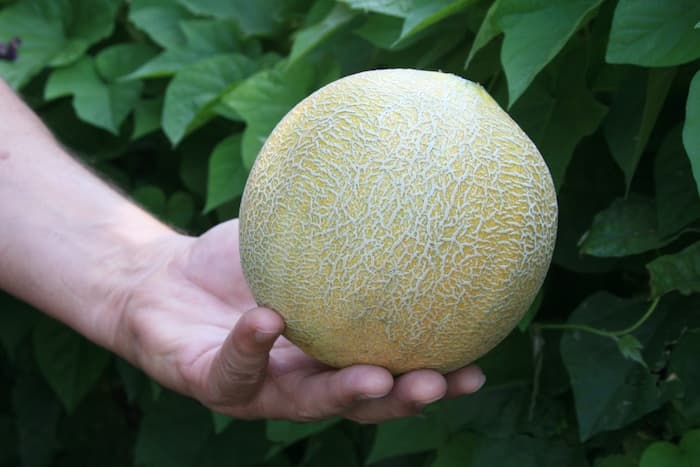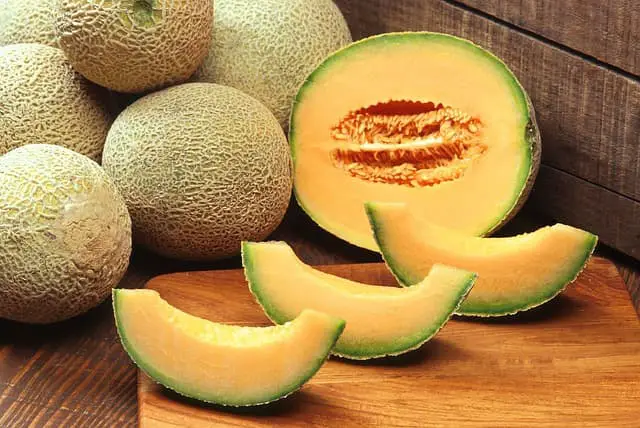Muskmelon is a sweet, yellow-fleshed, and flavor-filled fruit that is a member of the Cucurbitaceae family. The fruit produces a characteristic musky aroma when ripe. Muskmelon has many cultivars with different names. For instance, Crenshaw, honeydew, and casaba are familiar examples of smooth-skinned muskmelons. On the other hand, cantaloupe, Santa Claus melon, and Persian melon are good examples of net-skinned muskmelons. Although cantaloupes often have net-like skin, some varieties have smooth skin, such as the European Cantaloupe. Cantaloupes emerge as a subject here because all cantaloupe varieties are considered muskmelons. Even so, not all cantaloupes can be regarded as muskmelons.

The Health benefits of Muskmelons
A muskmelon is packed with different essential minerals and vitamins. For instance, muskmelon is a rich source of potassium, vitamins A and C, and folate. The fruit also contains antioxidants that play a significant role in disease prevention. Thus, these nutrients make muskmelon a healthy choice.
Muskmelons help regulate blood pressure
Muskmelons help control blood pressure when consumed because it is a rich source of potassium. Usually, resistance to blood flow causes pressure build-up in the vessels. However, the potassium in this fruit aids in vasodilation, causing blood vessels to relax and allowing smooth blood flow. The ability to regulate blood pressure makes muskmelon a healthy fruit choice for all people, including those with hypertension.
Muskmelons aid in weight loss
Muskmelons can help manage weight when consumed regularly. The fruit particularly contains a lot of potassium, which promotes weight loss. Muskmelons also have low calories and high water content, which help with weight loss.
Besides, the high fiber content in muskmelons improves weight management by increasing satiety and reducing appetite levels. The low-fat content in a muskmelon also makes the fruit suitable for weight loss.
Muskmelons enhance skin health
Muskmelons have a 90 percent water content, which leaves the skin well hydrated and healthy when consumed. The fruit also contains vitamin C that plays a key role in collagen production. Collagen keeps the skin firm and youthful by eliminating fines lines and wrinkles. Further, muskmelons supply the body with folate, a vitamin that promotes smooth cell regeneration and helps maintain healthy and glowing skin.
Muskmelons boost immunity
Muskmelons improve immunity when added to the diet due to their high vitamin C content. Vitamin C is a potent antioxidant that helps prevent cell damage. Muskmelons also contain vitamin A, another strong antioxidant that plays a critical role in building immunity. Together, vitamins A and C boost the immune system and protect the body against infectious agents.
Muskmelons promote digestion and gut health
Muskmelons improve digestion and gastrointestinal health by providing dietary fiber. The high water and fiber content also promote regular bowel movement, reducing the likelihood of experiencing constipation. Dietary fiber further contributes to gastrointestinal health by promoting the growth of healthy stomach bacteria.
Muskmelons are also a rich source of vitamins A and C, which help improve digestion. Usually, vitamin A assists in maintaining a healthy mucosal lining, while vitamin C promotes the production of digestive acids.
However, eating muskmelon on an empty stomach is discouraged because the water in this fruit dilutes stomach contents and disrupts digestive processes. Therefore, eating muskmelons on an empty stomach will likely cause digestive problems.
Muskmelons lead to better vision and eye health
Muskmelons promote and help maintain good vision and eye health by providing valuable antioxidants. In particular, these fruits supply zeaxanthin, lutein, and beta-carotene, all of which contribute to better eye health. As a result, muskmelons can help reduce the risk of developing vision problems such as cataracts and macular degeneration. The fruits can also help promote proper eye function in healthy persons regardless of age because they contain essential vitamins and minerals.
Muskmelons help when pregnant
Muskmelons are beneficial to pregnant mothers, with their various nutrients contributing to better fetal health. For instance, folate helps prevent congenital disorders and keep the fetus healthy. The calcium in a muskmelon can also form strong bones and teeth and keep the mother’s calcium stores well nourished. Additionally, vitamins A and C can help regulate blood pressure, prevent common infections, and relieve constipation or indigestion in pregnant women.
Although muskmelons are mostly safe to eat when pregnant, they might sometimes become contaminated with listeria bacteria, rendering them unsafe for consumption. Consuming a muskmelon infected with listeria can cause preterm labor, miscarriage, or stillbirth.
Muskmelons help relieve arthritis
Muskmelons aid arthritis patients to alleviate pain because of their anti-inflammatory properties. Specifically, muskmelons contain phytochemicals, which function as antioxidants. These chemicals help neutralize free radicals, prevent oxidative stress, and arrest cellular damage. Consequently, the cumulative antioxidant and anti-inflammatory effects help reduce inflammation in the joints and bones and relieve pain in people with arthritis.
Muskmelons promote hair growth
Muskmelons are a good source of vitamin A. Vitamin A contributes to healthy hair by promoting sebum production in the body. The sebaceous glands secrete sebum, an oily secretion beneficial in keeping the hair healthy and well-moisturized. Muskmelons also have myo-inositol or inositol, a naturally-occurring substance that helps fight hair loss and stimulate hair growth.
Muskmelons reduce the risk of cancer
Muskmelons contain antioxidants in the form of vitamins A and C. Lycopene is also present in muskmelons and reduces cancer risk in those taking this fruit as part of their diet. In addition, more antioxidants come from muskmelons seeds and help destroy free radicals, reducing the risk of cancer even further.
Is It Okay to Eat Muskmelon Seeds?
It is perfectly fine to eat muskmelon seeds at least for most people unless you have a sensitive stomach. You can safely eat raw muskmelon seeds or choose to dry and roast them. If you prefer, you can add muskmelon seeds to your fruit serving, salad, or smoothies. More importantly, you can grind muskmelon seeds into a flour and use it to make pancakes, bread, or muffins. The seeds also go well with oatmeal, soups, and stir-fries.
Before eating muskmelon seeds, whether raw or roasted, you can remove the outer shell. The decision to eat muskmelon seeds with or without a shell will depend on your preference or how you intend to prepare and eat them. Otherwise, it is completely safe to eat muskmelon with their shells.
The Health Benefits of Muskmelon Seeds
Muskmelon seeds are very nutritious and beneficial to the body. Some nutrients present in muskmelon seeds include vitamin C, potassium, vitamin A, vitamin E, magnesium, zinc, vitamin K, omega-6 fatty acids, and phosphorous. The seeds also supply dietary fiber, protein, and carbohydrates.
These nutrients together contribute to the health benefits of muskmelon seeds. For instance, eating muskmelon seeds provides vitamin A, C, and E, which are good for the eyes. These vitamins work together to improve eyesight and prevent eye-related problems such as cataracts and age-related macular degeneration.
The potassium in muskmelon seeds can also help lower blood pressure and improve heart health. Similarly, omega-6 fatty acids and magnesium can support heart function and protect against heart conditions.
In addition, omega-6 fatty acids in muskmelons can promote hair growth and keep the skin healthy. Vitamin E and K can further help your skin glow and give it radiant tone.
The dietary fiber in muskmelon seeds also supports gut microorganisms and promotes digestive health. In this sense, the fiber acts as a prebiotic.
Omega-6 fatty acids and phosphorous also support metabolism and promote bone health. At the same time, phosphorous helps keep your teeth strong and aids in body tissue repair.
Side Effects of Muskmelon Seeds
As much as muskmelon seeds are healthy, they may sometimes cause unpleasant effects. The common side effects of muskmelon seeds are gas and bloating. These stomach problems happen when you consume an excessive amount of muskmelon seeds or if you have a sensitive stomach. Therefore, you should eat a smaller portion of muskmelons or avoid them entirely if your stomach is sensitive.


I had no idea cantaloupe had so many benefits! Thanks for enlightening me 🙂
You are most welcome. I am glad you learned something from my post.
Wow. Funny thing is when I was a little girl it seemed I couldn’t get enough of them. As I got older, I lost my taste for them, but it is worth it to eat them anyhow. Good to know. Thank you.
Thank you for sharing your experience with muskmelons. You should find new joy in eating them because you are now missing out on their many health benefits.
Yes, I can’t tell you how much I love muskmelon. Dad would buy this at market for us as children
Thank you for sharing your experience. You should now continue this tradition for you and your children because muskmelons are good for your health.
Reblogged this on Disablities & Mental Health Issues.
Oh wow I never knew what a musk melon was, we call them spanspek here in South Africa. The story goes that one of the early governer’s wives was Spanish and she preferred eating it for breakfast instead of bacon and so the servants called it spans-spek.. Feeling Which means Spanish – bacon in Afrikaans (which is similar to Dutch). I enjoyed learning about the nutrition, thank you.
Thank you for the brief local story. I agree muskmelons go by different names depending on the region or country of residence. I am, nevertheless, glad you enjoyed my post on muskmelons.
You are welcome, I enjoyed it very much. 😊👍
It is one of the most delicious fruits for sure!
Indeed, it is a healthy choice as well.
My favourite fruit 😍
I am glad you enjoy it.
I love melons, it’s one’of my favourite fruit
Thanks for the gentle reminder. 🧡🌿
You are most welcome. I am glad you read and enjoyed this blog.
I love this fruit
Yes, it is full of great taste. Its many health benefits provide even more motivation to add it to your diet.
Thank you, I check out the health benefit later.
Yes, you definitely should.